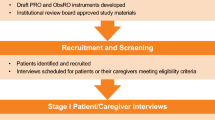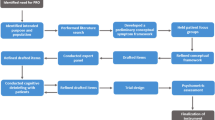Abstract
Background
Limited data exists about night-time symptoms that are generated directly from patients with gastroesophageal reflux disease (GERD) who have a partial response to proton pump inhibitor (PPI) therapy. This information is needed to select an appropriate instrument in studies in this patient population.
Objective
The objective of this qualitative interview study was to gain understanding of the night-time symptoms of patients with GERD who had a partial response to PPIs. The specific aims were (i) to evaluate whether GERD symptoms experienced during the night differ from those occurring during the day; and (ii) to understand the impact of night-time symptoms on sleep and next-day functioning.
Methods
Four US sites participated in this study of patients with GERD who, despite PPI therapy for at least 4 weeks, still experienced both daytime and night-time heartburn and/or regurgitation. Non-responders to PPIs were excluded. Patient statements were coded and grouped by concept.
Results
Twenty-nine patients were enrolled. The predominant and most troublesome symptoms during both the day and night were heartburn and regurgitation. At night-time only, expressions describing regurgitation were more frequent than those describing heartburn (62 vs. 26 %). During the daytime only, expressions describing regurgitation and heartburn occurred with similar frequency (21 vs. 27 %). Patients experienced greater severity of heartburn and regurgitation at night than during the day, and the difference was more pronounced for regurgitation. Patients focused on symptom frequency during the day but on symptom severity at night. Of expressions about the impact of night-time GERD symptoms, 46 % described impact on sleep and 41 % described compensatory behaviors when woken up by symptoms. Next-day impacts of night-time symptoms predominantly included changes in diet (53 %).
Conclusions
Partial responders to PPI therapy experience similar GERD symptoms at night and during the day. However, regurgitation is more predominant at night than during the day, and at night patients focus more on symptom severity than symptom frequency.
Similar content being viewed by others
References
Dent J, El-Serag HB, Wallander MA, et al. Epidemiology of gastro-oesophageal reflux disease: a systematic review. Gut. 2005;54(5):710–7.
van Pinxteren B, Numans ME, Bonis PA, et al. Short-term treatment with proton pump inhibitors, H2-receptor antagonists and prokinetics for gastro-oesophageal reflux disease-like symptoms and endoscopy negative reflux disease. Cochrane Database Syst Rev. 2004;4:CD002095.
Donnellan C, Sharma N, Preston C, et al. Medical treatments for the maintenance therapy of reflux oesophagitis and endoscopic negative reflux disease. Cochrane Database Syst Rev. 2005;2:CD003245.
El-Serag H, Becher A, Jones R. Systematic review: persistent reflux symptoms on proton pump inhibitor therapy in primary care and community studies. Aliment Pharmacol Ther. 2010;32(6):720–37.
Jones RH, Hungin AP, Phillips J, et al. Gastro-oesophageal reflux disease in primary care in Europe: clinical presentation and endoscopic findings. Eur J Gen Pract. 1995;1:149–54.
Zagari RM, Fuccio L, Wallander MA, et al. Gastro-oesophageal reflux symptoms, oesophagitis and Barrett’s oesophagus in the general population: Loiano-Monghidoro study. Gut. 2008;57(10):1354–9.
Food and Drug Administration. Patient-reported outcome measures: use in medical product development to support labeling claims. 2009. Food and Drug Administration: Rockville. Final guidance document. http://www.fda.gov/downloads/Drugs/GuidanceComplianceRegulatoryInformation/Guidances/UCM193282.pdf. Accessed 29 Jan 2013.
Farup C, Kleinman L, Sloan S, et al. The impact of nocturnal symptoms associated with gastroesophageal reflux disease on health-related quality of life. Arch Intern Med. 2001;161(1):45–52.
Shaker R, Castell DO, Schoenfeld PS, et al. Nighttime heartburn is an under-appreciated clinical problem that impacts sleep and daytime function: the results of a Gallup survey conducted on behalf of the American Gastroenterological Association. Am J Gastroenterol. 2003;98(7):1487–93.
Dean BB, Aguilar D, Johnson LF, et al. Night-time and daytime atypical manifestations of gastro-oesophageal reflux disease: frequency, severity and impact on health-related quality of life. Aliment Pharmacol Ther. 2008;27(4):327–37.
Gerson LB, Fass R. A systematic review of the definitions, prevalence, and response to treatment of nocturnal gastroesophageal reflux disease. Clin Gastroenterol Hepatol. 2009;7(4):372–8 quiz 367.
Pare P, Meyer F, Armstrong D, et al. Validation of the GSFQ, a self-administered symptom frequency questionnaire for patients with gastroesophageal reflux disease. Can J Gastroenterol. 2003;17(5):307–12.
Rentz AM, Kahrilas P, Stanghellini V, et al. Development and psychometric evaluation of the patient assessment of upper gastrointestinal symptom severity index (PAGI-SYM) in patients with upper gastrointestinal disorders. Qual Life Res. 2004;13(10):1737–49.
Revicki DA, Rentz AM, Tack J, et al. Responsiveness and interpretation of a symptom severity index specific to upper gastrointestinal disorders. Clin Gastroenterol Hepatol. 2004;2(9):769–77.
Spiegel BM, Roberts L, Mody R, et al. The development and validation of a Nocturnal Gastro-oesophageal Reflux Disease Symptom Severity and Impact Questionnaire for adults. Aliment Pharmacol Ther. 2010;32(4):591–602.
Locke GR, Talley NJ, Weaver AL, et al. A new questionnaire for gastroesophageal reflux disease. Mayo Clin Proc. 1994;69(6):539–47.
Carlsson R, Dent J, Bolling-Sternevald E, et al. The usefulness of a structured questionnaire in the assessment of symptomatic gastroesophageal reflux disease. Scand J Gastroenterol. 1998;33(10):1023–9.
Bytzer P, van Zanten SV, Mattsson H, et al. Partial symptom-response to proton pump inhibitors in patients with non-erosive reflux disease or reflux oesophagitis: a post hoc analysis of 5796 patients. Aliment Pharmacol Ther. 2012;36:635–43.
Patrick DL, Burke LB, Gwaltney CJ, et al. Content validity—establishing and reporting the evidence in newly developed patient-reported outcomes (PRO) instruments for medical product evaluation: ISPOR PRO good research practices task force report. Part 1: eliciting concepts for a new PRO instrument. Value Health. 2011;14(8):967–77.
Patrick DL, Burke LB, Gwaltney CJ, et al. Content validity—establishing and reporting the evidence in newly developed patient-reported outcomes (PRO) instruments for medical product evaluation: ISPOR PRO Good Research Practices Task Force report. Part 2: assessing respondent understanding. Value Health. 2011;14(8):978–88.
Brod M, Tesler LE, Christensen TL. Qualitative research and content validity: developing best practices based on science and experience. Qual Life Res. 2009;18(9):1263–78.
Fass R. The relationship between gastroesophageal reflux disease and sleep. Curr Gastroenterol Rep. 2009;11(3):202–8.
Orr WC, Heading R, Johnson LF, et al. Review article: sleep and its relationship to gastro-oesophageal reflux. Aliment Pharmacol Ther. 2004;20(Suppl. 9):39–46.
Vakil N, Veldhuyzen van Zanten S, Kahrilas P, et al. The Montreal definition and classification of gastro-esophageal reflux disease (GERD): a global evidence-based consensus. Am J Gastroenterol. 2006;101(8):1900–20.
Bredenoord AJ, Weusten BL, Timmer R, et al. Air swallowing, belching, and reflux in patients with gastroesophageal reflux disease. Am J Gastroenterol. 2006;101(8):1721–6.
Dent J, Vakil N, Jones R, et al. Accuracy of the diagnosis of GORD by questionnaire, physicians and a trial of proton pump inhibitor treatment: the Diamond Study. Gut. 2010;59(6):714–21.
Orr WC. Therapeutic options in the treatment of nighttime gastroesophageal reflux. Digestion. 2005;72(4):229–38.
Katz PO, Koch FK, Ballard ED, et al. Comparison of the effects of immediate-release omeprazole oral suspension, delayed-release lansoprazole capsules and delayed-release esomeprazole capsules on nocturnal gastric acidity after bedtime dosing in patients with night-time GERD symptoms. Aliment Pharmacol Ther. 2007;25(2):197–205.
Dean BB, Aguilar D, Johnson LF, et al. The relationship between the prevalence of gastroesophageal reflux disease and disease severity. Dig Dis Sci. 2010;55(4):952–9.
Armstrong D, Talley NJ, Lauritsen K, et al. The role of acid suppression in patients with endoscopy-negative reflux disease: the effect of treatment with esomeprazole or omeprazole. Aliment Pharmacol Ther. 2004;20(4):413–21.
Fass R, Quan SF, O’Connor GT, et al. Predictors of heartburn during sleep in a large prospective cohort study. Chest. 2005;127(5):1658–66.
Kahrilas PJ, Howden CW, Hughes N. Response of regurgitation to proton pump inhibitor therapy in clinical trials of gastroesophageal reflux disease. Am J Gastroenterol. 2011;106(8):1419–25.
Boeckxstaens GE, Smout A. Systematic review: role of acid, weakly acidic and weakly alkaline reflux in gastroesophageal reflux disease. Aliment Pharmacol Ther. 2010;32(3):334–43.
Orr WC, Johnson LF, Robinson MG. Effect of sleep on swallowing, esophageal peristalsis, and acid clearance. Gastroenterology. 1984;86(5 Pt 1):814–9.
Acknowledgments
This study was funded by AstraZeneca R&D, Mölndal, Sweden. Dr Nesta Hughes, from Oxford PharmaGenesis™ Ltd, provided writing support funded by AstraZeneca R&D, Mölndal, Sweden.
Conflicts of interest
Anna Rydén, Katarina Halling and Anna Niklasson are employees of AstraZeneca R&D, Mölndal, Sweden. Mona Martin has received consultancy fees from AstraZeneca R&D, Mölndal, Sweden.
Author contributions
Anna Rydén is the guarantor for the overall content and took a lead in determining the study concept and design, as well as drafting and critically reviewing the manuscript, and had a role in interpreting the data. Mona Martin took a lead in analysing and interpreting the data and had a role in determining the study concept and design, as well as drafting and critically reviewing the manuscript. Katarina Halling and Anna Niklasson had a role in determining the study concept and design, analysing and interpreting the data, as well as drafting and critically reviewing the manuscript. All authors reviewed and approved the final manuscript.
Author information
Authors and Affiliations
Corresponding author
Electronic supplementary material
Below is the link to the electronic supplementary material.
Rights and permissions
About this article
Cite this article
Rydén, A., Martin, M., Halling, K. et al. Night-Time Symptoms and Their Impact on Sleep in Patients with Gastroesophageal Reflux Disease Who Have a Partial Response to Proton Pump Inhibitors: A Qualitative Patient Interview Study. Patient 6, 307–314 (2013). https://doi.org/10.1007/s40271-013-0024-1
Published:
Issue Date:
DOI: https://doi.org/10.1007/s40271-013-0024-1




